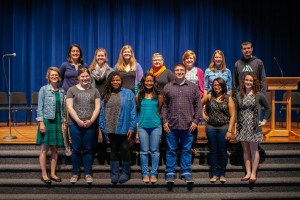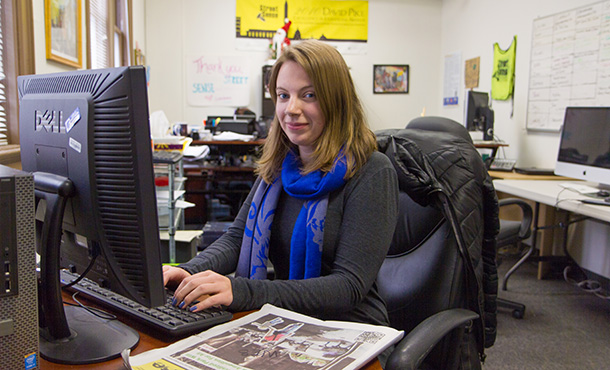Homelessness wasn’t something Abby Hershberger was familiar with while growing up in Millersburg, Ohio, a town of about 3,500 residents.
“It didn’t happen to people I knew,” she says. “It didn’t happen to my friends or family. I just wasn’t exposed to it.”
During a spring semester at Eastern Mennonite University’s Washington Community Scholars’ Center, Hershberger contributed to a unique initiative that amplifies the voices of homeless people and the issues that affect them. It’s a reality of life in the metropolitan D.C. area “that I would never experience as a tourist,” she says.
Hershberger, a history major says she “loves writing,” was an editorial intern at the urban newspaper “Street Sense,” which combines the talents of staff, volunteers, and homeless writers and vendors to provide a voice for the impoverished of Washington D.C.
The mission of the “biweekly street paper” is “to offer economic opportunities for people experiencing homelessness in our community by elevating voices and encouraging debate on poverty and injustice,” according to Street Sense’s website.

About 100 active vendors from among the homeless population of Washington D.C. sell 16,000 papers every other week, with the average vendor earning $45 a day. There are five paid staff and a team of artists-in-residence, volunteers, interns, and homeless contributors.
Phone interviews, council and neighborhood meetings, editing, research, and writing comprised her days: “I get to do a little bit of everything,” Hershberger said.
To gain a sense of Hershberger’s recent assignments, check out the following links:
- A profile of deceased activist Concepcion Picciotto, a Spanish immigrant who moved to the United States to protest, for the next 35 years, the country’s involvement in terror and injustice around the world;
- An article covering the construction of a children’s center in Ward 8;
- Coverage of a contentious public meeting in which the mayor shared plans to close the D.C. General Shelter, “a huge, unsafe shelter,” in favor of opening “eight smaller, family-oriented temporary shelters across the city;”
- her contributing work about the revitalization of a former psychiatric hospital into a residential and commercial district.
Her work has provided deep insights. Hershberger says that hearing “so many personal stories is showing me how multi-dimensional homelessness is, and teaching me to find wisdom in each of the stories that I hear.” She has learned how people end up in difficult situations by chain reactions, which she explains as “slowly losing everything you thought you had, and then ending up helpless.”
One of her final assignments has been looking into a daycare, early education, and employment resource center for homeless families.
“My internship has forced me to look for hope and progress where I wouldn’t think to look,” she said during a chapel service at EMU with her fellow WCSC housemates in late March.
